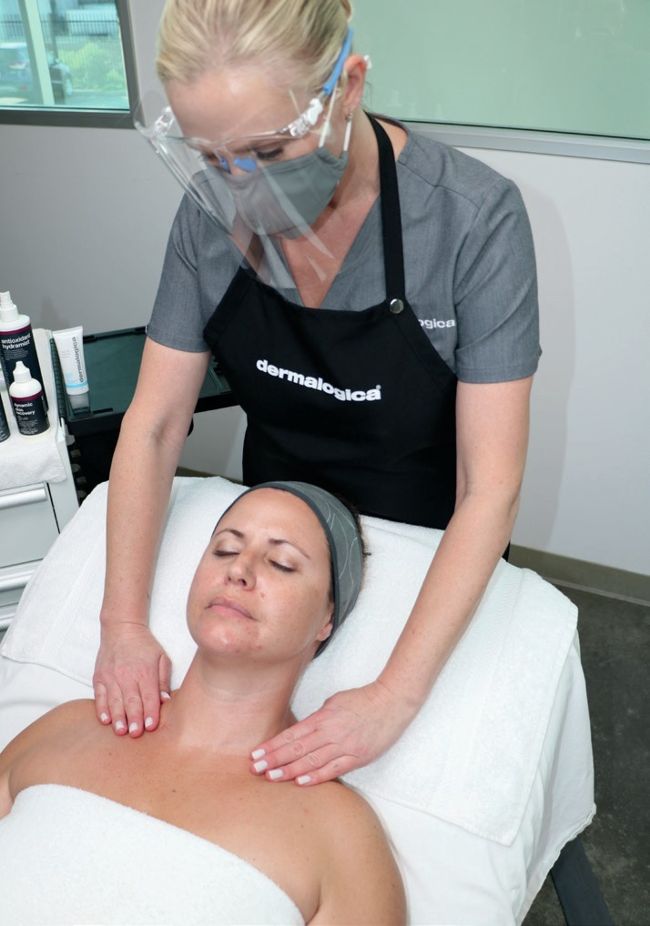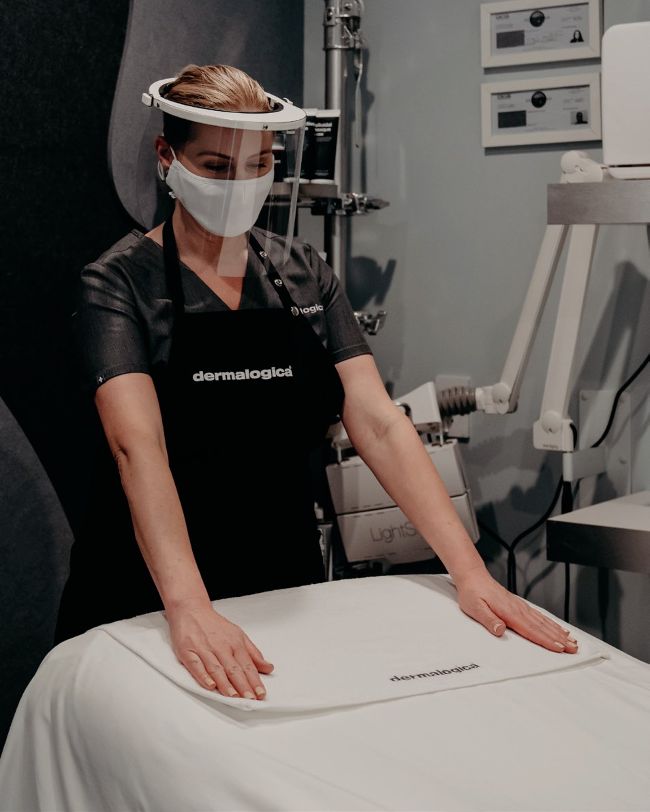INTERVIEW
TALKING TO… MARK HERMANN
Dermalogica’s general manager for the UK and Ireland tells us about the brand’s new training programmes, surviving Covid-19 and the company’s plans for the future
In under two decades, Mark Hermann has risen from retail manager at The Body Shop to Dermalogica’s general manager for the UK and Ireland, with a few stops along the way. In the two years since he joined the professional skincare brand, Hermann has overseen the opening of accounts, stores and new training programmes rolled out to therapists, with the majority taking place during the global coronavirus pandemic.
Training its therapists has always been at the heart of Dermalogica, with the brand starting as an education centre after founder Jane Wurwand’s success launching the International Dermal Institute in 1983.
During Covid-19, when treating the skin was deemed a high-risk activity, Dermalogica worked to develop a new training programme to make treatments with skin-to-skin contact safer for both therapists and clients. “We developed the Clean Touch Certification training programme to ensure treatments were safe, and opened it up to all therapists, not just those using Dermalogica, to beat coronavirus together,” says Hermann.

Dermalogica therapist performing Face Mapping skin analysis with client
The certification, which teaches the brand’s 12 key principles for enhanced service safety to both make-up artists and skin therapists, has proved extremely successful, as has the launch of the Clear Framework training, put in place to reinvent how skin therapists work with customers to increase post-treatment sales.
The framework is designed to remove the worry of getting a “no” when pushing for a sale and encourages therapists to begin selling products during the treatment, rather than after it has ended.
“We’re taking away the selling moment that therapists seem to hate, instead integrating that into the treatment by having therapists inform clients ‘this is the product I’m using now and what it does; at home you should use this product to follow up from your treatment for these reasons’,” explains Hermann
The implementation of the Clear Framework into salons has proven a great addition for the 600 therapists trained in it. “The aim was an uplift of 15% in sales, which we thought wouldn’t happen – it’s never been seen before,” says Hermann. The programme has actually led to an uplift of 35% in average spend per client for therapists using the framework during salon treatments.
Dermalogica offers more than treatment and retail training for therapists. They are also coached in other areas they may not be as experienced in, such as social media marketing and branding – both to sell products and treatments and to stay in touch with clients to build relationships and encourage repeat custom.
The brand also offers a range of grad schemes in non-therapist roles. The training in managing social media proved important during the pandemic, allowing therapists to continue to connect with clients while they were unable to perform services and undergo further treatmentbased training.
The brand’s attitude towards Covid-19 proved to be successful, with Dermalogica understanding the need to stay on top of work instead of using the furlough scheme and taking time off.
“We spent more time training and contacting staff and therapists – we didn’t furlough anyone,” says Hermann. “Unlike other brands, we kept servicing our field-based staff and stayed in contact because we knew if we wanted to have a business in the future that we needed to help our clients survive through the coronavirus lockdowns.”
By keeping on top of its relationships during the pandemic, the brand has seen a growth compared to its pre-pandemic figures. “As many other businesses are, we’re comparing ourselves more to 2019 (pre-Covid-19) because to have an uplift compared to last year, it’s not really a massive achievement,” he explains. “We actually have seen a very healthy growth this year compared to 2019.”
Plan for growth
As for the future, Hermann is focused on taking Dermalogica to the next level financially. “By the end of 2022, we are planning to grow Dermalogica in the UK and Ireland by 25%,” he says, adding that he plans to implement a new retail and treatment concept to draw in customers and aid him in reaching his goal.
Hermann has set out to change the way people buy Dermalogica, too, offering a guided retail experience at kiosks and stores in response to how customers were encouraged to shop online during the pandemic. “What we want to do is attract people to the brand through the stores, offer the experience, and then start to push them out to their local therapists,” he says. The stores, which were fitted during Covid-19 lockdown, aim to build a bridge between retail and salons, pushing customers who would normally not explore the treatment side of the brand towards booking their first Dermalogica facial.
“The new shop fit has an experience element, with treatment stations around the open space to give clients the qualitative treatment experience in the middle of the store. There are things in the physical space that you just can’t get online – getting a virtual facial is just not possible,” he says.
Changing consumer behaviours
Hermann understands that while it may seem as though life is slowly returning to normal, the pandemic will have a long-term effect. While he believes that finding the spaces and customers for the retail stores and pop-ups will not be an issue, Hermann worries that due to the growing desire to work from home, fewer people will be training for in-salon, customer-facing beauty therapist roles.
“I can find the customers. I can find the locations. But can I find the therapists? That’s going to be my challenge,” he says.
The new way of working is not the only reason for the therapist shortage either, with Hermann adding that Brexit has had a part to play too. “A lot of the people having to leave are those in the service industry – restaurants, hotels, retail and therapists.
These roles aren’t the kind that you apply for after attending university, so we’re pushing away those who would naturally step into these positions,” he says.
Hermann remains positive though, hoping that through Dermalogica’s education centres, and the existing therapists the brand has on board, the issue will be overcome easily. “We try to get into the centres and bring people on board with the brand and integrate them into the therapist world as early as possible, so we can guarantee them jobs,” he adds.

Dermalogica’s Pro Power Peel

Dermalogica therapist in the treatment room
Four years prior to Hermann joining the team at Dermalogica, the brand was acquired by consumer goods company Unilever, which also owns pro brand Murad and consumer skincare brands Simple and Ren. When a professional brand is bought out by a large multinational there is often a fear among salon owners that it will lose the personal touch or focus on retail and forget its professional accounts.
Despite being acquired by the company, Hermann maintains that Dermalogica is independent when it comes to making any decisions within the brand. “People look at our business decisions and think, ‘that’s happened because they were taken over by Unilever; it never would have changed or been implemented before’. The reality is that they do not have any influence on the day-to-day operations of the company.
“I’m questioned more at Dermalogica than I was in previous companies. They ask if I come up with ideas myself, or if Unilever has told me to pitch it. They’re sceptical, which is good – it keeps me on my toes.”
Coming into his role, Hermann has also faced questions as to whether, due to his background in retail, the salon business will become be less important and training will take a back seat. He is adamant it will continue to be the priority for the brand.
“The overlap between retail and salon is only 2.5%, and our footprint in retail is relatively small. I know some are sceptical and think we’re trying to make money from retail, but we make no money out of it,” he says. “We do it because to be a relevant skincare brand today, you need to be in front of the customer, but the backbone of the business is, and always will be, therapists.”